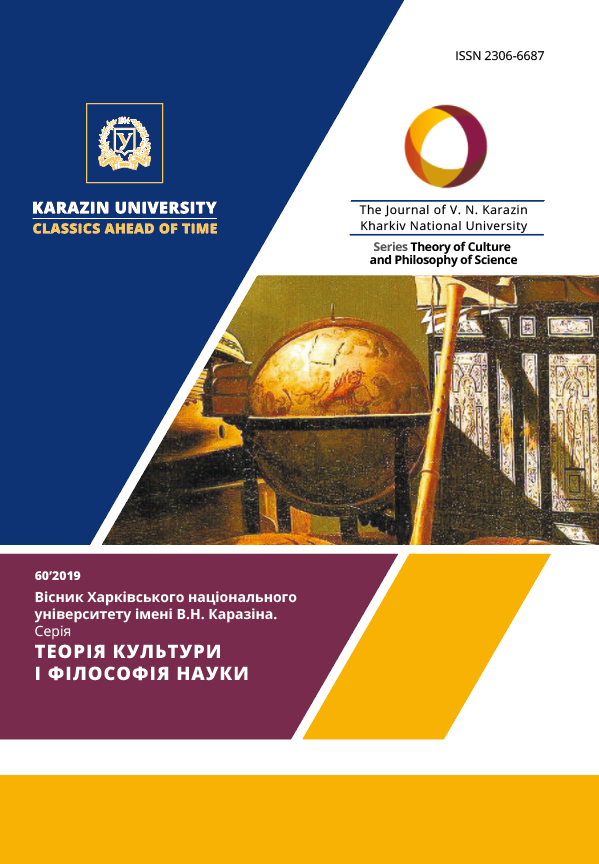(DIS)AGREEMENT OF THE POLITICAL AND THE AESTHETICAL IN PHILOSOPHY OF JACQUES RANCIERE
Abstract
The article analyses Jacques Rancière’s theory of paradoxical interconnection between politics and aesthetics in contemporary culture. Author argues that Rancière’s theory belongs to the trend in modern philosophy, which develops the concept of autonomy of political referring back to Karl Schmitt, while Rancière’s theory of art is based on the concept of autonomy of the aesthetical, and represents politics and aesthetics as two modes of sensuality, or, in terms of Rancière, ‘the distribution of the sensual’. In this context, Rancière understands the connection between aesthetics and politics not in the sense of the ‘aesthetisation of politics’ inherent to the ‘age of the masses’, compromised by great totalitarian projects, but as a special sensual regime, which, according to Rancière, coincides with the regime of democracy as an absolute anomaly of power. Rancière’s thesis that the political, starting from antiquity, is being displaced and depoliticized by the so called post-politics as promise of a tolerant, rational post-ideological consensus and post-democracy, or ‘democracy without demos’, is considered in the context of Rancière’s analysis of contemporary art. As alternative to modern forms of depoliticisation and rational consensus, Rancière proposes the formation of new type of rationality - rationality of disagreement or dissensus, as type of paradoxical rationality that correlates with the paradoxicality of really political action as unpredictable/ impossible. The purpose of modern art, as well as modern politics, is, according to Rancière, to create unpredictable and undecidable aesthetic gap that provides for the effect of new sensibility and consonance in affect or ‘community of equals’ that implements the principle of equality here and now.
Downloads
References
Бадью А. Рансьер и сообщество равных. Можно ли мыслить политику? Краткий трактат по метаполитике / пер. с фр. Б. Скуратов, К. Голубович. Москва: Логос, 2005. С. 189–194.
Київський Інтернаціонал – 68 сьогодні. Центр візуальної культури, 11.05.2018. URL: http://vcrc.org.ua/68-now/.
Лапицкий В. Путешествие на край политики. Рансьер Ж. Эстетическое бессознательное. Санкт-Петербург, Москва: Machina, 2004. С. 102–126.
Рансьер Ж. Большой розговор. С французским философом побеседовал его украинский коллега и переводчик Андрей Репа. Colta, 21.06.2018 URL: https://www.colta.ru/articles/society/18387-zhak-ransier-bolshoy-razgovor.
Рансьер Ж. Взрывы непредсказуемы. Что делать? Газета новой творческой платформы. №17. 18.05.2007, а. URL: http://abuss.narod.ru/Biblio/polis/rancier_chto.htm.
Рансьер Ж. На краю политического /пер. с фр. Б. М. Скуратова. Москва: Праксис, 2006, a. 240 с.
Рансьер Ж. Разделяя чувственное /пер. с фр. В. Лапицкого, А. Шестакого. Санкт-Петербург: Издательство ЕУ в СПб, 2007, b. 264 с.
Рансьер Ж. До и после 11 сентября: разрыв в символическом строе? /пер. с фр. В. Лапицкого. Мир в войне. Москва: Прагматика культуры, 2003. С. 47–57.
Рансьер Ж. Несогласие: Политика и философия / пер. с фр. и прим. В. Е. Лапицкого. Санкт-Петербург: Machina, 2013. 192 с.
Рансьер Ж. Интервью. Радио Cвобода. 04.07. 2006, б. URL: https://www.svoboda.org/a/163313.html.
Рансьер Ж. Учитель-незнайко. П’ять уроків із розкріпачення розуму / пер. з фр. А. Рєпи. Київ: Ніка-Центр, 2013. 168 с.
Жижек С. Устройство Разрыва. Параллаксное видение / пер. с англ. А. Смирнов, Г. Рогонян, С. Кастальский, А. Олейников. Москва: Европа, 2008. 516 с.
Butler J. Frames of War: When Is Life Grievable? New York, London: Verso, 2009. 193 p.
Hardt M., Negri A. Assembly. New York: Oxford University Press, 2017. 346 p.
Mouffe C. On Political. London, New York: Routledge, 2005. 144 p.
Marchart O. Thinking Antagonism: Political Ontology after Laclau. Edinburg: Edinburg University Press, 2018. 258 p.
Norval A. Aversive Democracy: Inheritance and Originality in the Democratic Tradition. Cambridge; New York: Cambridge University Press, 2007. 238 p.
Norval A. «Writing a name in the sky». Critically Reading Ranciere on Democracy. Paper presented to the University of Chicago Political Theory Workshop. 1. 03. 2010. URL: http://ptw.uchicago.edu/Norval10.pdf
Ranciere J. Disagreement: Politics and Philosophy / transl. by J. Rose. Minneapolis, London: University of Minnesota Press, 1999. 159 р.
Stavrakakis Y. Negativity and Democratic Politics: Radical Democracy beyond Reoccupation and Conformism. Radical Democracy between Lack and Abundancy / L. Tonder and L. Tomassen eds. Manchester and New York: Manchester University Press, 2005. P. 182–205.
Zizek S. The Lesson of Ranciere. Ranciere Jacques. The Politics of Aesthetics. The Distribution of the Sensible. London, New York: Continuum, 2004. P. 67–79.




